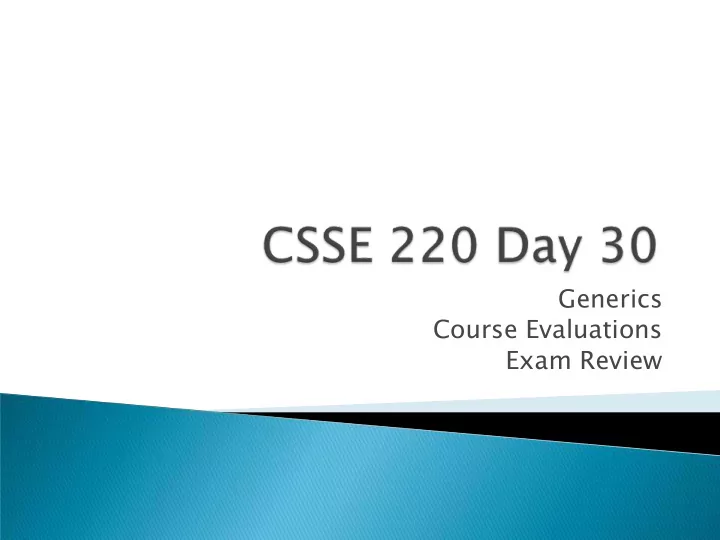

Generics Course Evaluations Exam Review
Another way to make code more re-useful
Collections just stored Object s ◦ Better than creating different collection classes for each kind of object to be stored ◦ Could put anything in them because of polymorph lymorphism ism Used casts to get types right: ◦ ArrayList songs = new ArrayList(); songs.add (new Song(“Dawn Chorus”,“Modern English”)); … Song s = (Song) songs.get(1); ◦ songs.add (new Artist(“A Flock of Seagulls”)); Song t = (Song) songs.get(2); Q1
Can define collections and other classes using type parameters ◦ ArrayList<Song> songs = new ArrayList<Song>(); songs.add (new Song(“Dawn Chorus”, “Modern English”)); … Song s = songs.get(1); // no cast needed ◦ songs.add (new Artist(“A Flock of Seagulls”)); compile-time Lets us use these classes: error ◦ in a variety of circumstances ◦ with strong type checking ◦ without having to write lots of casts Q2
Create a doubly linked list Include min() and max() methods Use polymorphism orphism rather than null checks for the start and end of the list Include fromArray() factory method Q3
Type parameters: ◦ class DLList<E> Bounds: ◦ class DLList<E extends Comparable> ◦ class DLList<E extends Comparable<E>> ◦ class DLList<E extends Comparable<? super E>> Generic methods: ◦ public static <T> void shuffle ( T[] array) Q4,5
Your chance to improve instruction, courses, and curricula.
Exam is Monday, 1pm, G308 Same format as previous exams, about the same length Comprehensive, but focused on Ch. 13-17, 20
o Simple recursion o Function objects o Mutual recursion o Linked-list implementation o Time-space trade-offs o Basic data structure use o Basic sorting algorithms and efficiency o Selection, insertion, o ArrayList, LinkedList, merge, and quicksort Stack, Queue, o Efficiency, best/worst HashSet, TreeSet, case inputs HashMap, TreeMap o Big-oh notation, o Multithreading (not locks) estimating big-oh o Generics behavior of code
Recommend
More recommend